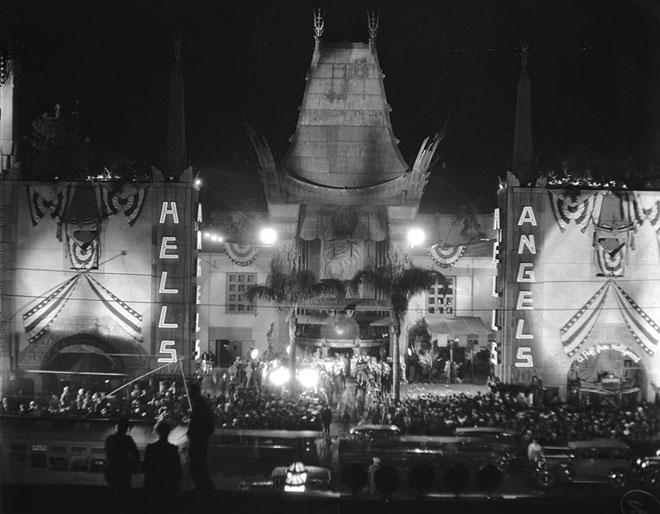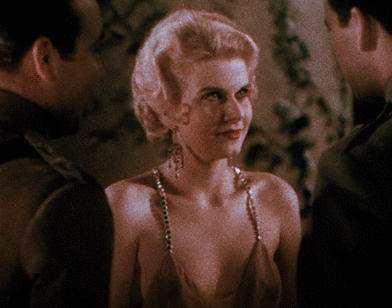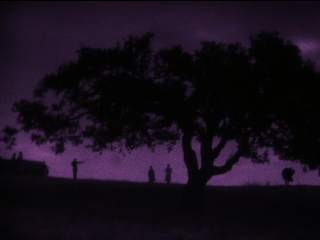Having just gotten back from a trip to beautiful Los Angeles, it seems fitting to write about the silver screen tonight.
Just recently, my husband and I sat down with some popcorn to watch Hell's Angels, Howard Hughes's 1930 epic about the Great War. I must admit, I was not sure what to expect of this film; though I was aware of its subject matter and some of the drama surrounding its production, I did not know much else about it.
An episode of the excellent podcast, You Must Remember This, had rekindled our interest in the movie and we moved it to the top of our DVD delivery service queue. The confluence of modern technologies by which the film manifested in our living room seems a fitting frame for the viewing experience; Hell's Angels has an arresting freshness untroubled by the eight decades that stand between its making and modern viewers. Though it often gets rather short critical shrift, I am unconvinced by those who claim that the film's production history eclipses the movie itself.
Hell's Angels features simply awe-inspiring aeronautical stunt sequences and a human drama mirrored by the incredible rise and fall of the flying machines that defy gravity and belief as they arc through the air...There are multitudes of details, themes, and other aspects that one might address in any critical take on this film. I'll focus this post on just a couple of them.
And without further ado...
And without further ado...
 |
I was just here! Well, in a way.
The Hell's Angels premiere at Grauman's Chinese Theatre, Los Angeles, 1930.
From graumanschinese.com
|
*** England's dreaming ***
While the film and its actors, for the most part, are American, the story is set in England and Europe. Both places are depicted in times of pre-war innocence and during the grimmer war years. In particular, however, the film anchors itself in an idealized England, a place and time seen as though through a pleasant (Hollywood-mediated) haze, with a sort of nostalgia or longing built into scenes of carousing university students and lavish parties. In the pre-war years, England represents a space of temporary union and friendship for the two British protagonists, Roy and Monte, and their university classmate, a young man summoned against his will to return home to Germany for military service near the film's beginning.
The dreamy pre-war England of Hell's Angels is defined not only by ephemerality but by a chimerical evasiveness. The film suggests that this place might not exist at all. Like an illusion that lives only on the silver screen, Hell's Angels acknowledges that the England that means so much to some of its characters might be no more than the stuff of dreams. As various characters learn, just as soon as their desire for this place seems to shift to belonging, it--the old-world values, innocence, and the promises it seems to make--seems to disappear, leaving its would-be denizens heir only to a cold awakening, a rougher modernity.
*** Time travel ***
There is no explicit time travel in this film. However, just as it becomes difficult to separate the real from the imagined pre-war England, the past and the present--both the wartime present within the film and the post-war moment of the film's making--maintain a complicated entanglement throughout.
Early in the film, a chivalric pistol duel is depicted in silhouette, abstracting the setting and characters to harken back to previous centuries.
|
|
| A duel. Still from taoyue.com |
The scene precedes the war's advent in the film, but it foreshadows later encounters between two characters who represent not only opposing nations but generations locked into conflict.
Some time later, a lovely color sequence depicts a ball given just as soldiers prepare to leave for war. Jean Harlow, who plays Roy's promised love interest but Monte's irresistible temptress, is dazzling in a gauzy chiffon and jeweled gown. She is a confident but self-absorbed character, resistant to the old-fashioned future to which she seems doomed because of her connection to the rather conservative Roy.
 |
Jean Harlow as Helen.
GIF from pre-code.com
|
While Roy seems to hail from an older world than his counterparts, Harlow's Helen is like a visitor from another time altogether, a kind of futuristic Hollywood yankee in King Arthur's court, if you will. Her modern sensibility distances her from both men, especially the idealistic Roy. She is unconcerned about her reputation amongst her fusty contemporaries or the degree to which they share her vision of the present and the future.
As they register on film, Helen's appearance and attitude are rather jarring. She is not a particularly sympathetic character, but there is something perhaps compelling, or at least startlingly recognizable, in her manner and look. They appear out of time within the film; Helen seems aware that she does not belong to the world that surrounds her. In truth, she looks like she belongs in ours. Just as Roy and others long for an illusory past, Helen seems a harbinger of a world beyond the present, beyond the war.
Helen looks forward, fearlessly. Her suitors see only a heavily mediated version of her--something angelic or devilish, held up only to the somewhat dim light of the present moment.
...
I'll stop here for this evening. There is so much to say about this film! I'll follow up this post with another on the fascinating story of the Royal Flying Corps, whose history Hell's Angels prompted me to study.
Cheers,
Fiona
Text © Fiona Robinson
Fiona
Text © Fiona Robinson
_04.jpg)
